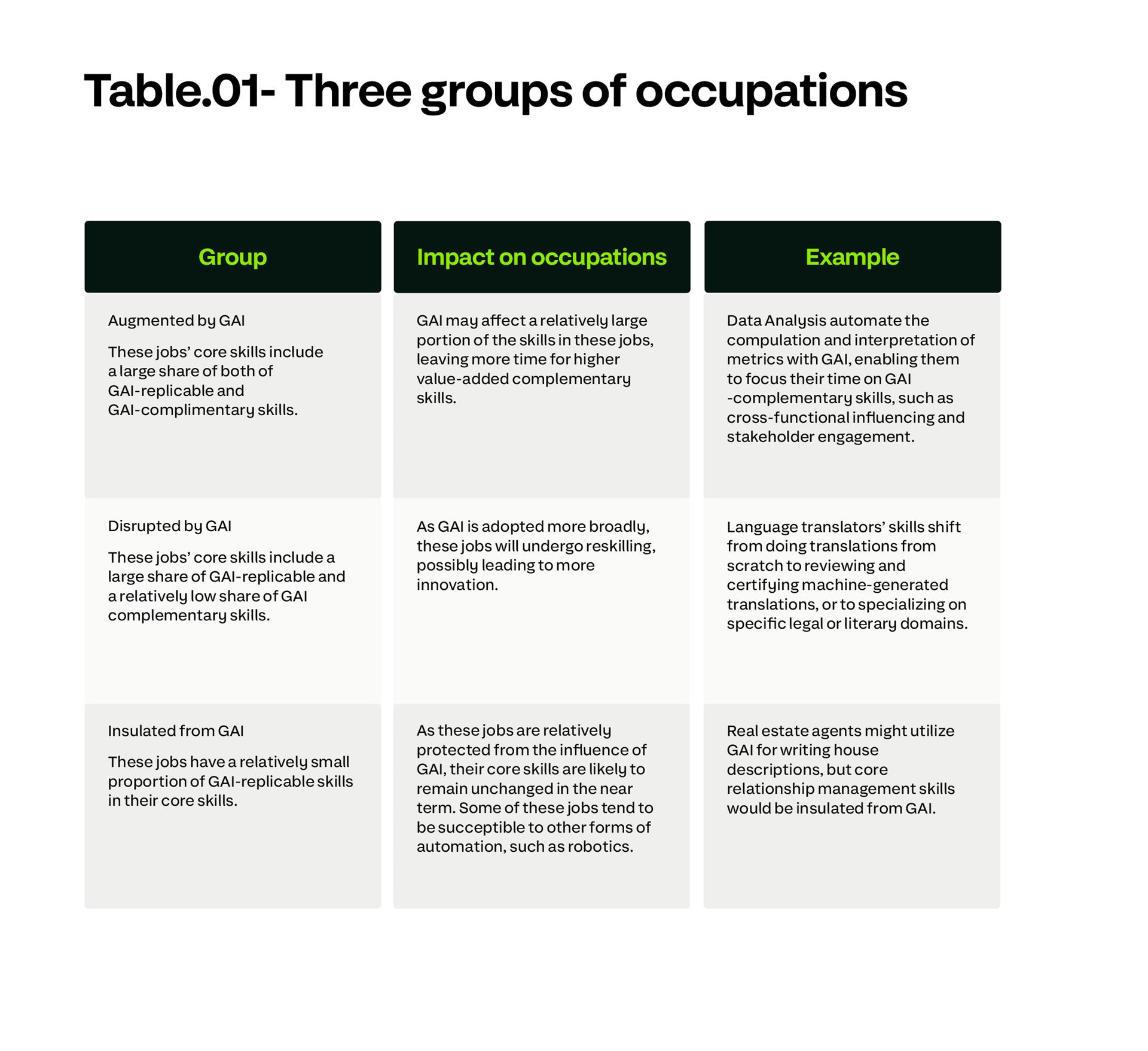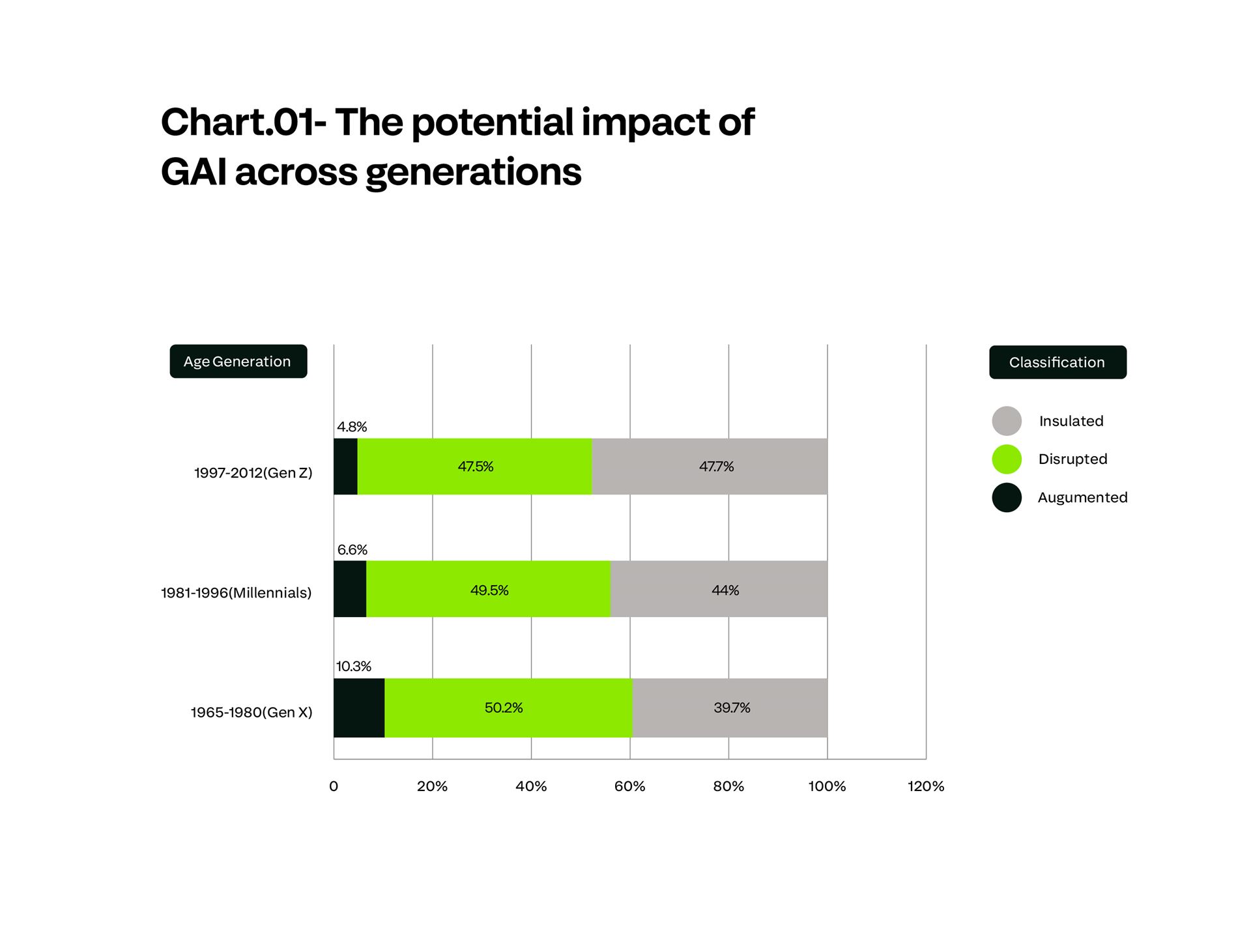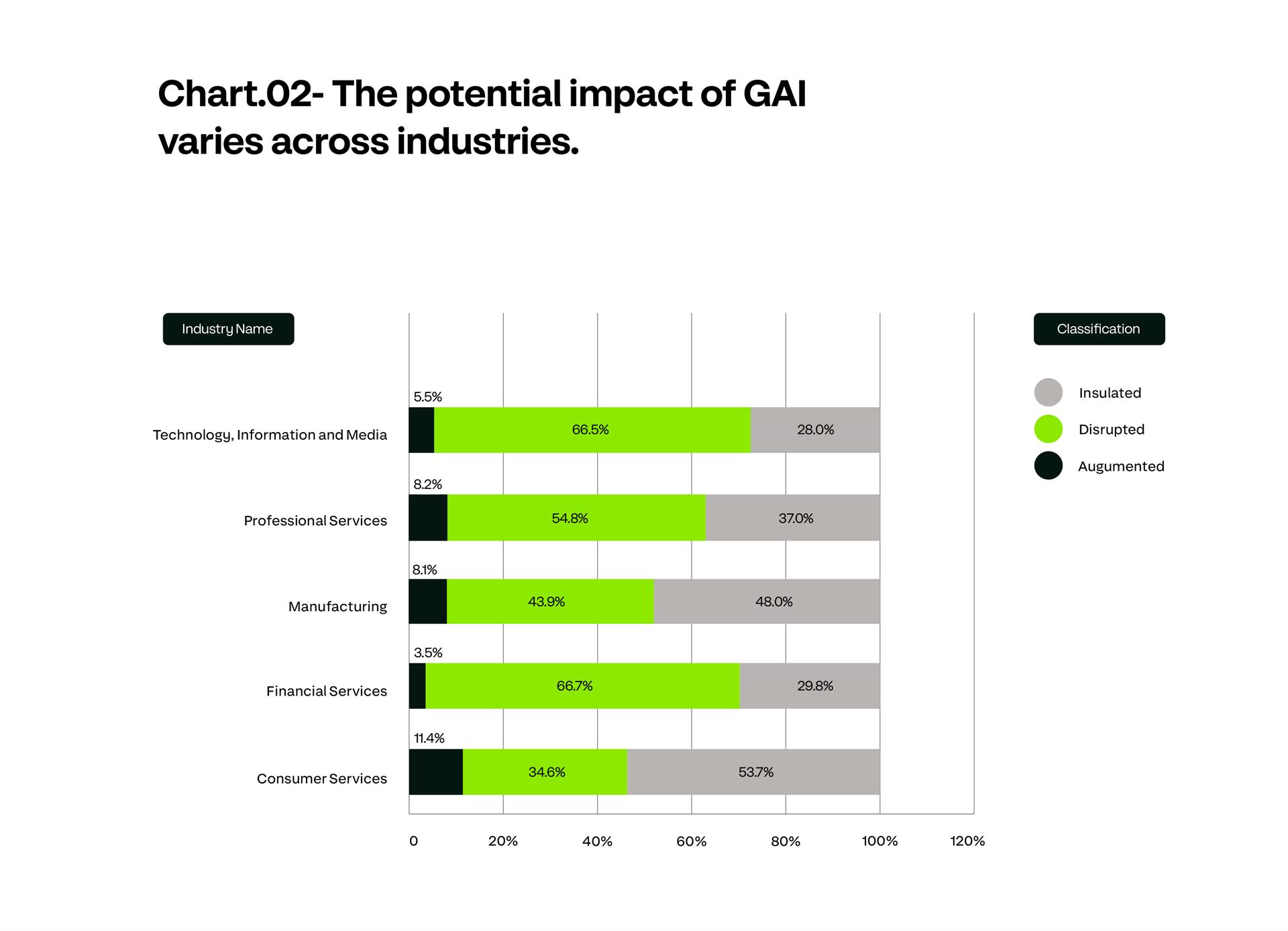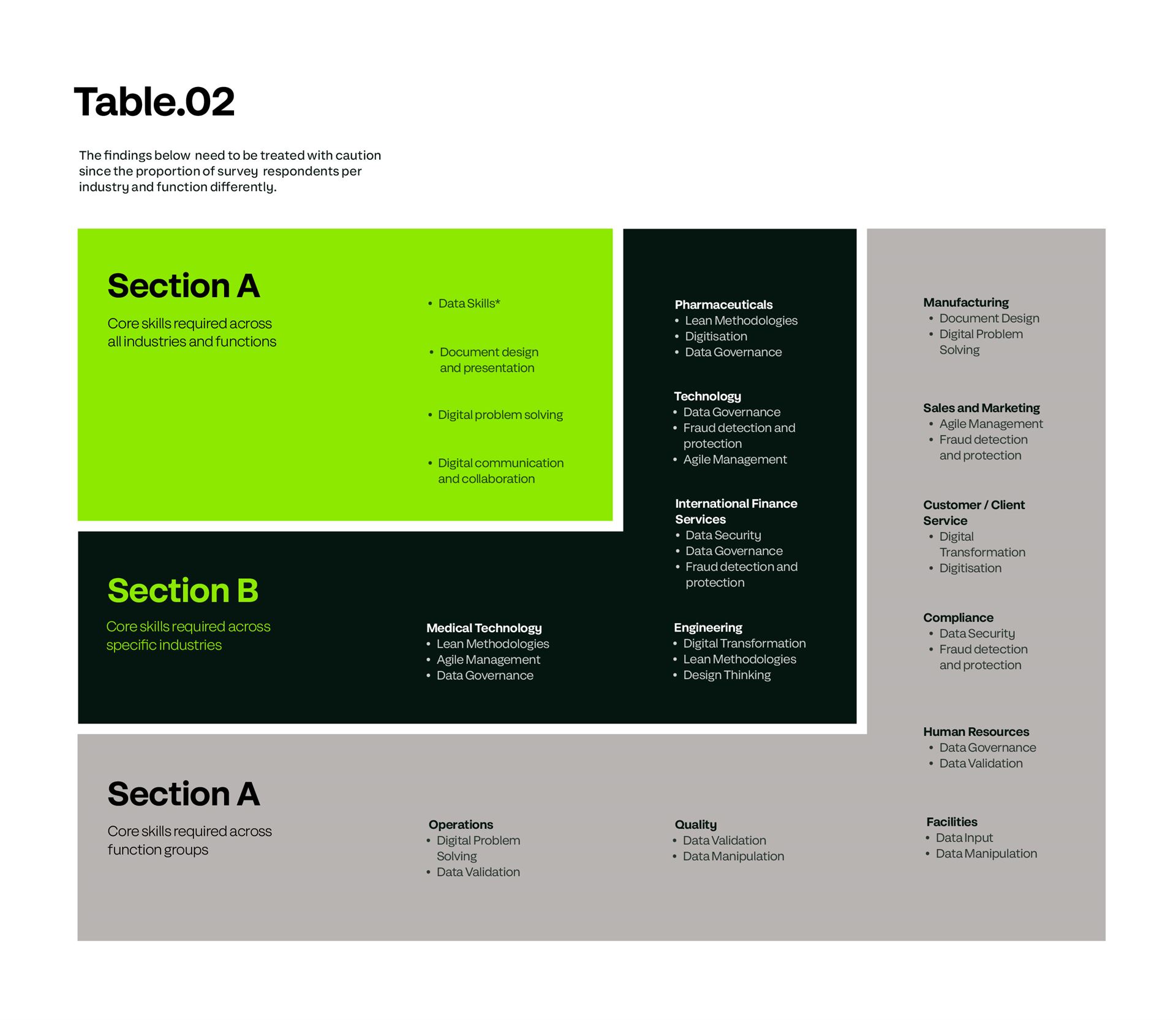Ireland's edge: Reinventing work and unlocking talent potential through generative AI
The use of AI in industry and society is not new. Many companies have for years used AI models for a range of tasks such as defect detection, supply chain optimisation, drug discovery, predictive maintenance, fraud detection and chatbots. In our daily lives, AI algorithms such as Machine Learning, Computer Vision and Natural Language Processing power e-commerce recommendations and voice-controlled virtual assistants. Generative AI (GenAI) models that create new content based on patterns learned from existing data have been used for many years, but advances in Large Language Models (LLM) have vastly increased the scale and scope of generative AI capability.
Ireland is in a strong position to maximise the potential benefits of generative AI tools such as GPTs. We have the highest level of third level attainment and highest level of STEM graduates per capita in the EU . Our workforce, as the LinkedIn data below shows, is equipped with generative AI insulated skills. The scientific ecosystem ranks in the top 10 globally for knowledge diffusion, impact and absorption. Ireland also has an agile, responsive national education ecosystem capable of producing the types of upskilling and reskilling programmes needed to deepen the workforce’s technical and transversal skills.
How will Generative AI change skills and work?
A recent Trinity College Dublin-Microsoft Ireland study of 400 senior leaders in Ireland found that 49% of organisations are already using generative AI in some form and 47% believe the technology will enhance productivity. Globally, the PwC 2024 CEO Survey found that 70% believe generative AI will change how their company creates value and 58% expect generative AI to improve the quality of their products or services. Almost two-thirds expect it to have a positive impact on employee’s time at work. The OECD view is that AI is unlikely to cause net job losses, but it will change the nature of work as generative AI is leveraged across business processes. LinkedIn members globally have already seen the core skills of their jobs evolve by 25% since 2015 . LinkedIn predicts that skills in Ireland will change by 54% by 2030, with GAI expected to accelerate this change to 73%. As generative AI tools are adopted by industry, skillsets required will continue to change, moving from routine tasks to more complex and creative unique work. This will drive increased demand for upskilling and reskilling, and potentially accelerate the shift to a skills-based labour market.

LinkedIn’s skills framework examines how skills could be impacted by Generative AI technologies by two skill types:
- GAI-replicable skills: skills that can likely leverage generative AI such as content creation, data analysis, programming.
- GAI-complementary skills: skills that intrinsically rely on human proficiency and can be complemented by GenAI. These are transversal skills such as innovation, creativity, teamwork, leadership, problem-solving, negotiation, influencing.
Using the skills-based framework, LinkedIn have classified occupations by the percentage of core skills that are potentially GAI-replicable GAI- complementary. Insulated occupations have a low proportion of GAI-replicable skills. Disrupted roles have more GAI-replicable skills compared to GAI-complementary skills.
Chart 1 shows the percentage of the 2+ million LinkedIn members in Ireland by age cohort and the proportion of roles that could be augmented or disrupted by generative AI and those that are insulated. Disrupted occupations indicate an opportunity to leverage generative AI to carry out routine tasks and processes, freeing up people to focus on higher value work that requires more creativity, critical thinking, problem solving and collaboration.
Chart 1
The degree to which generative AI could be applied across industry sectors is shown in Chart 2, which shows the proportion of roles across FDI industry sectors that might be disrupted. augmented or insulated from generative AI. Again, there is significant opportunity to apply generative AI to reduce the time spent by workers on routine tasks and allow them to focus on more productive work that requires strong transversal skills. Consequently this will enable people to strengthen their generative AI insulated or transversal skills. The impact on occupations and industries will depend on how much and how quickly the market adopts generative AI technologies.
Chart 2

Leveraging AI and human skills to advance Irelands digital economy
The Irish education ecosystem is already keenly aware of the fundamental need for digital, AI and data skills for every citizen. The IDA Ireland – Skillnet Ireland study on digital and data skills for non-IT workers identifies the fundamental skills required across all industry and roles (Chart 3). The ability to understand, manage and analyse data will be critical to understand how generative AI tools can be used and their limitations. The AI Skills Study identifies the skills that educators, industry and policy makers need to appropriately and effectively manage and apply AI tools.Government investment is providing the training and education opportunities required to upskill people and continue to produce talent with the skills to thrive in an AI enabled world. For example, the short, accredited Microcredentials available through Microcreds.ie and programmes provided by State agencies such as Skillnet Ireland provide a variety of courses aimed at upskilling the workforce in AI and Data.
Allied to this government investment in upskilling the workforce there are also important partnerships with industry to help scale such efforts. In this regard, Microsoft Ireland’s SkillUpIreland programme is committed to reaching 1m students over 4 years via their Dream Space STEM programme and, allied to that initiative, is a national AI skilling programme in partnership with Fast Track in to IT (FIT) to give people of all ages, experiences and ambitions the opportunity to develop their AI fluency and skills. These, and other industry led initiatives in partnership with NGOs or HEIs, add breadth and depth to Ireland’s skilling and upskilling ambitions.
Table 2

In the future of work the conversation must be about skills, not job displacement. Building the right skills in the current and future workforce to adopt and complement generative AI and automation technologies will be vital to maintain industry competitiveness. Transversal, data, and basic AI skills are key to maximise the benefits of AI technologies and understand the limitations.
Business Leaders need to understand the opportunities created by generative AI across their business and apply AI tools to generate insights, drive efficiencies, increase productivity, and improve how people experience work. Leaders must invest in talent development so employees have the capability to combine AI tools, business knowledge and transversal skills to innovate and invent new and better products and services; ultimately creating more rewarding, fulfilling and productive workplaces of the future.
